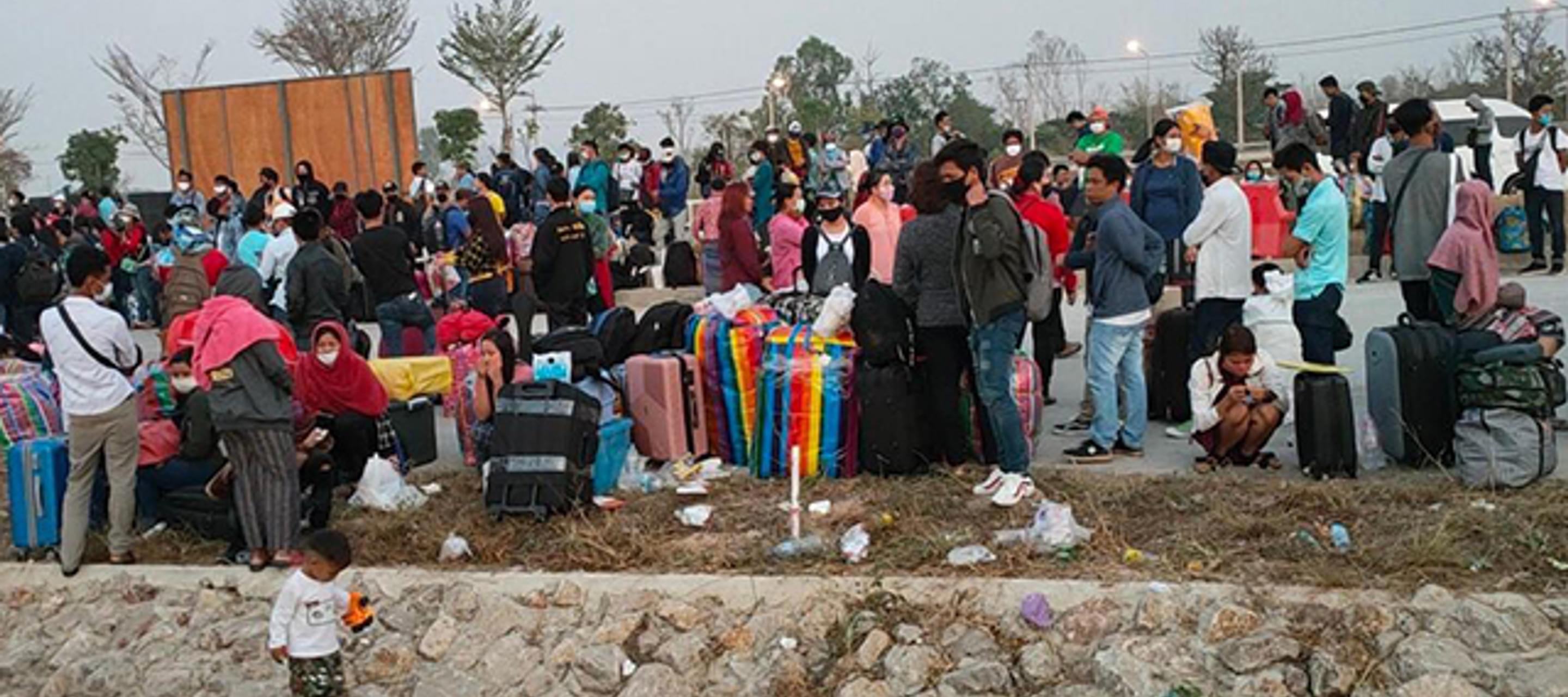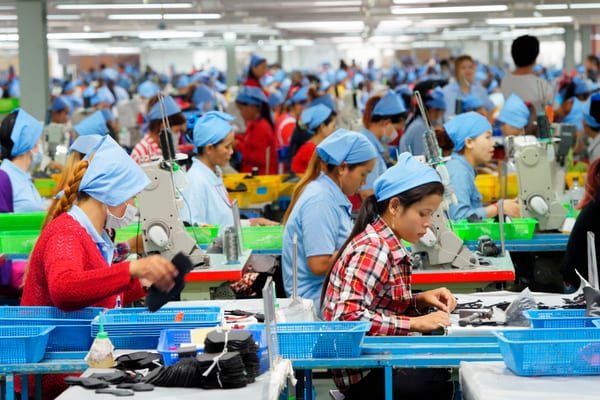Pandemic Prejudice – COVID-19 and Discriminatory Attitudes Towards Migrant Workers (Pt 3)
29 July 2020

COVID-19 and Migrant Workers
As part of our continuing focus on the links between COVID-19 and the business and human rights agenda, IHRB is exploring the impact of the pandemic on migrant workers across Asia and the roles and responsibilities of businesses in addressing these challenges. Most of the 35million+ migrant workers estimated to live and work in the Gulf Cooperation Council (GCC) countries are from Africa or South and Southeast Asia. Across the Association of Southeast Asian Nations (ASEAN) states, an estimated 10 million migrant workers live and work in major destinations such as Malaysia, Singapore, and Thailand. During the pandemic, countries in the GCC and Singapore were ranked in the top ten for infection rates per million, and almost all cases were from migrant workers living in dormitories.
This five part series begins with an overview of the range of challenges facing migrant workers throughout South East Asia as a result of the ongoing COVID-19 pandemic. Subsequent pieces in the series will cover accommodation conditions, discrimination issues, recruitment fees and wage theft, as well as impacts to migrant workers’ remittances back home.
As awareness has grown of the extent to which migrant workers are impacted by COVID-19 in the Gulf States and destination countries in Southeast Asia, so too has recognition of another contagion - the persistent prejudice and discrimination these workers face.
Policy and public discussions since the outbreaks have highlighted the fact that migrant workers not only make up the majority of COVID-19 cases in these regions, but also face segregation from society or are viewed as second class citizens from the rest of the population. This comes as no surprise as studies on public attitudes towards migrant workers have already shown. COVID-19 heightens the consequences of not addressing a neglected and stigmatised section of a population. Business and governments can lead the way to improve public attitudes towards migrants. The consequences of this can only be positive.
COVID-19 heightens the consequences of not addressing a neglected and stigmatised section of a population.
Someone Else’s Problem
Many Gulf countries acted to reduce infection risks by repatriating migrant workers en masse. This was supported by some prominent voices. Across the Gulf, certain media personalities, actors, and expressed xenophobic sentiments, receiving both criticism and approval by some in response. In one online case, a South Asian migrant worker of the Saudi oil giant, Aramco, was shown dressed as a life-sized sanitiser dispenser. The photos drew fierce criticism and the company later apologised for this action.
In Malaysia, when apartment buildings in the capital were placed under total lockdown – and with them their migrant worker inhabitants from Bangladesh, India, and Pakistan – a senior minister announced that foreign missions from workers’ home countries were responsible for distributing aid and not the Malaysian Government. While awareness of the dire living conditions of migrant workers increased and the areas under lockdowns did receive food supplies from government agencies, civil society organisations and others sources, there was still a mix of both compassion and xenophobic sentiments on social media with some Malaysians questioning why the government had to supply food to these workers.
Positive attitudes towards migrant workers have declined over the last decade, even as overall labour migration has increased.
The Thai government’s Centre for Covid-19 Situation Administration (CCSA) came under criticism in early May for separating the counts for Thai nationals and migrants who have become infected after posting an infographic with smiling faces on social media, ‘Finally there are zero infections in Thais’, and in smaller fonts, ‘But 18 foreigners are infected’. 17 of the 18 infected were female, and one 10 year old in a detention facilitywith illegal migrants. The CCSA would later amend the infographic.
Although migrant workers perform various forms of essential work and services in Thailand, awareness of their contributions is low. Xenophobic sentiments were reportedly high among Thais posting anti-migrant comments in Thai social media circles following reports of the COVID-19 outbreaks in immigration detention facilities. Critics also pointed out that Thai media had fanned anti-migrant prejudice creating an ‘us’ (Thai citizens) versus ‘them’ mentality.
In Singapore, racist comments and stereotypes were aired in mainstream and social media. An opinion piece blamed the spread of COVID-19 in dormitories on the personal hygiene habits of migrant workers from ‘backward countries’. When the government announced new dormitories would be built near residential areas, comments on Facebook perpetuated narratives of migrant workers as threats to public order, while others complained about property prices dropping. Another opinion piece, written by an engineer with five decades of experience in civil and marine engineering, made a draconian proposal for placing migrant workers on floating dormitories as a long-term solution to prevent and cope with similar outbreaks.
A 2019 study on public knowledge and attitudes towards migrant workers in Japan, Malaysia, Singapore, and Thailand by the International Labor Organization and UN Women reported that positive attitudes towards migrant workers have declined over the last decade, even as overall labour migration has increased. Between 52% to 83% of the survey respondents in the four countries perceived that crime rates had increased due to migrant workers. And between 41% to 68% thought migrant workers threaten their country’s culture and heritage. Similarly, some among the public thought that migrant workers have a poor work ethic and that they cannot trust them.
Heightened police presence in areas where migrant workers congregate; barricades which prevent them from entering residential zones; and banning of domestic workers from using facilities in condominiums also suggest reinforced stereotyping and discrimination.
Leadership is Needed
The COVID-19 crisis has reminded us all that ongoing discrimination against migrants requires renewed attention and concrete action by governments, businesses, and other actors. Protecting the human rights of migrants is not only the right thing to do, but is also critical in ensuring the effective functioning of the economies and societies of which they are part.
Protecting the human rights of migrants is not only the right thing to do, but is also critical in ensuring the effective functioning of the economies and societies.
To reverse the negative trend of considering migrant workers as a transient labour force, immigration and employment policies should be reformed to ensure that migrant workers are able to fully access rights on par with nationals. This includes policies and operating procedures that support social inclusion, including access to services, social security, health facilities and schools.
Ghettoization of migrant workers’ accommodation encourages segregation and discrimination. City planning can promote social inclusion by integrating migrant workers into the local community. IHRB’s developing work on the built environment recommends that everyone has the opportunity to participate meaningfully in the decisions that affect their neighbourhoods and lives. This includes women, children, minorities, persons with disabilities, migrant workers and others whose perspectives are often excluded.
Community events where migrant workers and the public can interact also encourages social cohesion and can help debunk common myths, such as viewing migrant workers as criminals or a threat to culture. Public education on prejudice and diversity, including news media and school programmes, can shape attitudes and change discriminatory social norms and stereotypical behaviours.
Within their own operations, companies can take steps as well, such as conducting research and surveys to understand their staff knowledge, attitudes, and practices towards their workers. Such studies can be critical in addressing negative behaviours to build a healthier work environment and to demonstrate support for their migrant workforce. Employers can also actively promote gender-sensitive policies and practices that tackle gender stereotypes and occupational segregation that especially affect female migrant workers.
Brands, employers, recruiters have a responsibility to respect the rights of their migrant workers – this requires active steps to prevent, mitigate, and remediate impacts. They should ensure that government responses and plans to address and contain COVID-19 take into account migrant workers’ vulnerabilities. They can also use their leverage to work with authorities in countries of origin and destination to develop solutions for migrant workers unable to return home due to travel restrictions, or consider flexible arrangements for migrant workers in situations where employment sites have to close.
In addition, recommendations by the IOM CREST include setting up a mechanism for burden sharing between brands and suppliers, to incentivise protection measures for the migrant workers that make up these shared labour value chains. Businesses can also ease the economic burden for migrant workers by ensuring they are covered by social protection measures such as sick leave and reimbursement of recruitment fees and associated costs.
Covid-19 does not discriminate, nor should our collective response.
***
In Part 4, we’ll turn to a challenge facing many migrant workers - indebtedness due to exorbitant recruitment fees. This situation is a significant factor in their compliance with degrading working and living conditions. We’ll look at the need for regulation of recruitment practices to prevent excessive recruitment fees, and the importance of providing migrant workers with better financial security that will empower them to reject dehumanising conditions.
Image: Flickr/Prachatai




